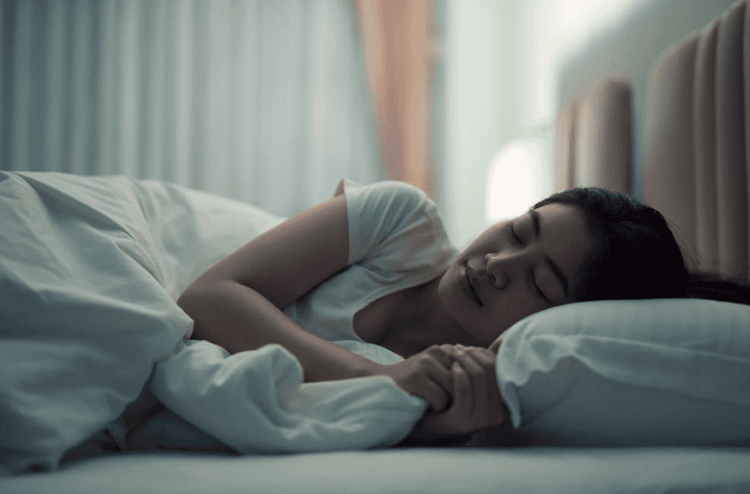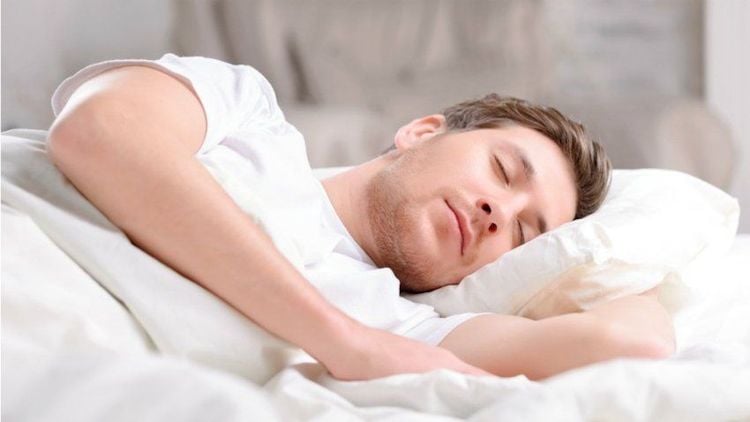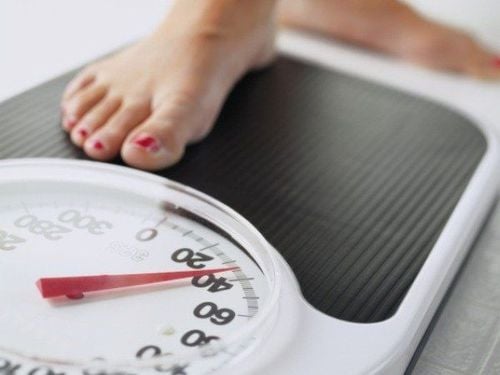This is an automatically translated article.
Everyone wants to have a good night's sleep after a long tiring day at work. Getting enough sleep keeps you healthy and alert. However, many older people do not sleep well. If you're always drowsy or finding it hard to get enough sleep at night, it may be time to see a doctor. So what is the best way to get a good night's sleep? The article will help you get the right way to sleep better.1. How to have deep sleep
You want a good night's sleep? Definitely something everyone wants because sleep directly affects your mental and physical health.Sleep can seriously affect your daytime energy, productivity, emotional balance, and even your weight. However, many of us frequently toss and turn at night, struggling to get the sleep we need.
It's hard to get a good night's sleep when you're awake at 3 a.m., but you can control the quality of your sleep more than you realize
There are many reasons why you're tossing and turning night and affects your mood, health, heart, immune system, creativity, vitality and weight. Here are some ways to get a good night's sleep, help you enjoy a better night's sleep, boost your health, and improve the way you think and feel during the day.
1.1. Tip 1: Stay in sync with your body's natural sleep-wake cycle Getting in tune with your body's natural sleep-wake cycle, or circadian rhythm, is one of the most important strategies for staying healthy. sleep better. If you keep a regular sleep-wake schedule, you will feel much more refreshed and energized than if you slept the same number of hours at different times, even if you just changed your sleep schedule. yours an hour or two.
Set a certain time to go to bed and wake up every day. This helps your body establish a routine and optimizes the quality of your sleep. Choose a time to go to bed when you feel tired, so you don't have to toss and turn. If you get enough sleep, you will wake up naturally without an alarm. If you need an alarm clock, you may need to go to bed earlier.
Avoid sleeping in - even on weekends. The more different your weekend/weekday sleep schedule, the worse you'll experience jetlag-like symptoms. If you need to make up for a late night's sleep, choose a daytime nap instead of sleeping in. This keeps you from disrupting your natural sleep-wake rhythm.
Be wise in taking a nap. While napping is a good way to make up for lost sleep, if you have trouble falling asleep or toss and turn at night, napping can make things worse. Limit naps to 15-20 minutes in the early afternoon.
Fights sleepiness after dinner. If you feel drowsy before bedtime, you can do something mildly stimulating, like calling a friend, folding your clothes, and getting ready for the next day.

Cách để có giấc ngủ ngon là thiết lập thời gian ngủ hợp lý
During the day
Expose yourself to bright sunlight in the morning. The closer to puberty the better. Like having a coffee outside or having breakfast by a sunny window. The light on your face will wake you up
Spend more time outside during the day. Spend time working out in the sun, exercising outside, or walking your dog during the day instead of at night.
It would be nice to have more natural light into the home or workspace. Keep blinds and shades open during the day and try to move your desk closer to the window.
At night
Do not use your phone, tablet, computer or TV within 1-2 hours before going to bed, because the blue light emitted by these devices is annoying. You can minimize the impact by using devices with smaller screens, lowering the brightness, or using light-changing software like f.lux. It will be better if you listen to music or read a book instead of watching TV late at night. It is not recommended to read books with tablets because those devices have lights so it can be confusing
When it's time to go to bed, make sure the room is dark. Use thick curtains or blinds to block light from windows, or try a sleeping mask.
Turn off the lights if you wake up at night. If you need some light to safely navigate at night, you can use a dim night light in the hallway or bathroom, or you can use a small flashlight, this will help you fall asleep easily. easier.
1.3. Tip 3: Exercise During the Day People who exercise regularly will sleep better at night and feel less sleepy during the day. Regular exercise also improves symptoms of insomnia and sleep apnea and increases the time you spend in the deep, recovery phase of sleep.
The more vigorous exercise you do, the stronger the benefits of sleep. But if you walk just 10 a day also help improve the quality of sleep. Be patient and focused to build an exercise routine, as it can take several months of regular activity to see the sleep-promoting effects. For deep, better quality sleep, make time for proper exercise:
Exercise speeds up metabolism, raises body temperature, and stimulates hormones like cortisol. This is not a problem if you exercise in the morning or afternoon, but do not exercise close to bedtime, should practice at least 3 hours before bedtime to avoid affecting sleep.
If you're still having trouble sleeping, move your exercises earlier. Relaxing, low-impact exercises, such as yoga or gentle stretching in the evening, can help promote sleep.
1.4. Tip 4: Eat smart and healthy Your daytime eating habits will play a role in how well you sleep, especially in the hours before bed.
Limit caffeine and nicotine. You all know the effects of caffeine, you can stay awake ten to twelve hours after drinking it, similar to smoking, they are both stimulants that can disrupt your sleep, especially if you Use them near bedtime.
Don't have a late dinner near bedtime. Limit your intake of high-fat foods within two hours of going to bed. Avoid spicy or acidic foods, which can upset the stomach.
Avoid drinking alcohol before going to bed, do not drink too much water in the evening. Drinking a lot of water can lead to frequent bowel movements throughout the night, affecting your sleep
Eating a lot of foods with a lot of people and starches can trigger wakefulness at night disrupting deep sleep yours.
Nighttime snacks can help you fall asleep
For some people, a bedtime snack can help promote sleep. For others, eating before bed leads to indigestion and makes falling asleep more difficult. Here are some foods you can snack on before bed.
Half bread, turkey. A small bowl of whole grains and less sugar. Milk or yogurt. A banana .

Ăn uống khoa học cũng là một trong các cách để có giấc ngủ ngon
The problem of clearing your mind at night can also stem from your daytime routine. The more stimulated your brain is during the day, the harder it will be for you to slow down and relax at night. Maybe, like many of us, you constantly interrupt your day's tasks to check your phone, email, or social media. Then, when you go to sleep at night, your brain is so used to finding fresh stimulation, it becomes difficult for you to relax.
Help yourself by setting aside specific times of the day to check your phone and social media, and try to focus on one task at a time as much as possible. You will be able to calm your mind before going to bed better.
Deep breathing exercises to help you fall asleep
Breathing with your belly rather than your chest can trigger the relaxation response and lower your heart rate, blood pressure, and stress levels to help you fall asleep.
Lie down on the bed and close your eyes. Inhale through the nose. The hand on your stomach should rise. The hand on your chest should move very little. Exhale through your mouth and push all the air out while contracting your abdominal muscles. The hand on your stomach should move in as you exhale, but your other hand should move very little. Continue to inhale through your nose, then exhale through your mouth. Try to inhale enough for your lower abdomen to rise and fall. Count slowly as you exhale. Body scan exercise to help you sleep
By focusing your attention on different parts of your body you can identify where you are holding any tension or stress and release it .
Lie on your back, legs not crossed, hands relaxed at the hips, then close your eyes. Focus on your breathing for about two minutes until you begin to feel relaxed. Shift your weight to the toes of your right foot. Imagine each deep breath flowing to your toes. Maintain focus on this area for at least three to five seconds. Move your center of gravity to the sole of your right foot. Tune in to any sensations you feel in that part of your body and imagine each breath coming out of the soles of your feet. Then shift the weight to the right ankle, then repeat. Move to calves, knees, thighs, hips and then repeat this sequence for left leg. From there, move up your torso, over your lower back and abdomen, upper back and chest and shoulders. Pay attention to any areas of your body that feel a stretch. After completing the body scan, relax and note how your body feels. You should feel relaxed so you can fall asleep more easily. 1.6. Tip 6: Improve Your Sleep Environment A peaceful bedtime routine sends a strong signal to your brain that it's time to relax and let go of the stresses of the day. Improving your sleeping environment also helps you get a better quality sleep.
Keep your room dark, cool and quiet
Reduce noise. If you can't avoid or eliminate noise from neighbors, traffic, or other people in your home, try covering up with a fan or sound machine. Earplugs can also help.
Keep your room cool. Most people sleep best in a slightly cool room (about 65°F or 18°C) with adequate ventilation. Bedrooms that are too hot or too cold can interfere with sleep quality.
Make sure your bed is comfortable. Buy yourself a mattress or bed sheet that must be long enough for you to stretch and turn comfortably. You should lie down on a mattress or rug to avoid waking up with back or neck pain.
1.7. Tip 7: Learn how to get back to sleep Short awakenings during the night are normal but if you are having trouble falling back asleep the following tips may help:
Get out of your head. No matter how hard it is, try not to stress because you can't get back to sleep, because that stress only encourages your body to stay awake. To get away from your head, focus on the sensations in your body or practice breathing exercises. Inhale, then exhale slowly while saying or thinking the word, "Ahhh." Take a breath and repeat.
If you find it difficult to fall asleep, lay yourself down in bed and listen to a soothing meditation with a relaxed mind, this will help you feel more relaxed, can help rejuvenate your body
Postpone worry and brainstorm. If you wake up at night feeling anxious about something, jot it down on paper and put off worrying about it until the next day when things will be easier to deal with. Similarly, if a great idea keeps you awake, jot it down on paper and fall asleep knowing you'll be much more productive after a good night's sleep.

Bài tập thở sâu bạn hoàn toàn có thể thực hiện ngay trên giường cũng là cách để có giấc ngủ ngon
2. 17 proven ways to get a good night's sleep
2.1. Tăng tiếp xúc với ánh sáng mặt trời vào ban ngày Nhịp sinh học hay có thể hiểu là đồng hồ lưu giữ thời gian tự nhiên của cơ thể.Nó ảnh hưởng đến não, cơ thể và nội tiết tố của bạn , giúp bạn tỉnh táo và báo cho cơ thể biết khi nào đã đến giờ ngủ. Ánh sáng mặt trời tự nhiên vào ban ngày giúp giữ cho nhịp sinh học của bạn khỏe mạnh, cải thiện năng lượng ban ngày, cũng như chất lượng và thời lượng giấc ngủ vào ban đêm. Trong hầu hết các nghiên cứu liên quan đến những người có vấn đề nghiêm trọng về giấc ngủ, việc tiếp xúc với ánh sáng mặt trời ban ngày không chỉ cải thiện hoạt động ban ngày mà còn giúp ích cho giấc ngủ. Ở những người bị chứng mất ngủ, tiếp xúc với ánh sáng ban ngày đã cải thiện chất lượng và thời lượng giấc ngủ. Nghiên cứu cho thấy, tiếp xúc ánh sáng mặt trời làm giảm thời gian đi vào giấc ngủ tới 83%. Một nghiên cứu tương tự ở người lớn tuổi cho thấy tiếp xúc với ánh sáng mặt trời 2 giờ trong ngày làm tăng thời lượng ngủ thêm 2 giờ và hiệu quả giấc ngủ lên 80%.
2.2. Giảm tiếp xúc đối với ánh sáng xanh vào buổi tối Ngược lại với lợi ích của việc tiếp xúc ánh sáng mặt trời vào ban ngày, tiếp xúc với ánh sáng nhân tạo vào ban đêm có tác dụng ngược lại. Bởi ánh sáng xanh gây ảnh hưởng đến nhịp sinh học của bạn, đánh lừa bộ não của bạn rằng bây giờ vẫn là ban ngày, dẫn đến việc giảm các hormone như melatonin - hormone giúp bạn thư giãn và có giấc ngủ sâu. Với những thiết bị phát ánh sáng xanh với số lượng lớn như điện thoại thông minh và màn hình máy vi tính, cần tránh tiếp xúc vào buổi tối. Một số phương pháp phổ biến có thể sử dụng để giảm tiếp xúc với ánh sáng xanh vào ban đêm bao gồm:
Đeo kính ngăn ánh sáng xanh. Tải xuống một ứng dụng như f.lux để ngăn chặn ánh sáng xanh trên máy tính Cài đặt ứng dụng chặn ánh sáng xanh trên điện thoại thông minh trên Ch Play hoặc AppStore Tắt tivi và các thiết bị chiếu sáng 2 giờ trước khi ngủ. 2.3. Không tiêu thụ caffein vào chiều/cuối ngày Caffeine có thể nâng cao khả năng tập trung, năng lượng và hiệu suất thể thao.
Tuy nhiên, khi sử dụng vào cuối ngày, hệ thần kinh sẽ bị kích thích khiến cho cơ thể bạn không thể thư giãn một cách tự nhiên vào ban đêm. Một nghiên cứu cho thấy, tiêu thụ caffeine 6 giờ trước khi ngủ làm chất lượng giấc ngủ và giấc ngủ tồi tệ hơn đáng kể. Caffeine có thể lưu thông trong máu của bạn trong 6-8 giờ. Do đó, không nên uống một lượng lớn cà phê sau khoảng 3 đến 4 giờ chiều, đặc biệt nếu bạn nhạy cảm với caffeine hoặc đang khó ngủ.
2.4. Giảm giấc ngủ trưa không đều hoặc kéo dài Mặc dù giấc ngủ trưa hoặc một số giấc ngủ ngắn có lợi nhưng việc ngủ không đều đặn hoặc một giấc ngủ trưa/ngủ ngắn dài có thể ảnh hưởng không tốt đến giấc ngủ vào buổi đêm. Ngủ vào ban ngày có thể làm rối nhịp sinh học của cơ thể khiến cho bạn khó ngủ vào ban đêm. Trên thực tế, trong một nghiên cứu, những người thường chợp mắt vào ban ngày sẽ tạo thói quen buồn ngủ vào ban ngày. Một nghiên cứu khác chỉ ra rằng, ngủ trưa ít hơn 30 phút có lợi cho sức khoẻ, nhưng nếu ngủ nhiều hơn thì không tốt và còn ảnh hưởng đến chất lượng của giấc ngủ buổi đêm. Tuy nhiên, nếu người nào xây dựng được thói quen ngủ trưa thì sẽ không ảnh hưởng đến giấc ngủ buổi đêm, chất lượng giấc ngủ cũng như tính liên tục không bị gián đoạn. Nếu bạn ngủ trưa hàng ngày và ở một thời gian nhất định bạn không nên lo lắng, tác dụng của việc ngủ trưa tùy thuộc vào mỗi cá nhân.
2.5. Cố gắng thức dậy và đi ngủ ở những thời điểm thích hợp Nhịp sinh học của cơ thể hoạt động theo một vòng lặp nhất định, vòng lặp lại này có thể tự điều chỉnh theo thời gian mặt trời mọc và lặn, do đó ở các mùa khác nhau thì sẽ khác nhau. Một thời điểm đi ngủ và thức dậy thích hợp trong ngày có thể giúp bạn có một giấc ngủ dài chất lượng. Một nghiên cứu cho thấy rằng những người tham gia có thói quen ngủ không đều đặn và đi ngủ muộn vào cuối tuần cho biết giấc ngủ kém. Các nghiên cứu khác đã nhấn mạnh rằng nếu thói quen có giấc ngủ không đều có thể thay đổi nhịp sinh học và mức độ melatonin của bạn. Nếu gặp khó khăn để có một giấc ngủ ngon, hãy cố gắng tập thói quen thức dậy và đi ngủ vào những thời điểm tương tự nhau. Sau khi việc này thành thói quen, có thể sau vài tuần, bạn thậm chí có thể không cần báo thức.
2.6. Uống bổ sung melatonin Melatonin một hormone giấc ngủ quan trọng cho não bạn biết khi nào cần thư giãn và đi ngủ. Do đó, bổ sung melatonin là một chất hỗ trợ giấc ngủ là phương pháp được sử dụng phổ biến. Phương pháp này sử dụng để điều trị chứng mất ngủ. Có một nghiên cứu chỉ ra rằng, uống 2 mg melatonin trước khi ngủ sẽ cải thiện được chất lượng giấc ngủ và năng lượng vào ngày hôm sau và giúp mọi người đi vào giấc ngủ nhanh chóng hơn. Trong một nghiên cứu khác, ở một nửa nhóm ngủ nhanh hơn và cải thiện được 15% chất lượng giấc ngủ. Không có tác dụng gây nghiện nào ở 2 nghiên cứu kể trên. Melatonin cũng hữu ích khi đi du lịch giữa các vùng khác múi giờ vì nó giúp nhịp sinh học của cơ thể bạn trở lại bình thường.
Bắt đầu với một liều thấp để đánh giá về khả năng chịu đựng của bạn và sau đó tăng lên từ từ khi cần thiết. Vì melatonin có thể làm thay đổi hóa học của não, bạn nên kiểm tra với bác sĩ hoặc cơ sở cấp dịch vụ chăm sóc sức khỏe trước khi sử dụng. Sử dụng thuốc này trên trẻ em chưa được nghiên cứu kỹ.
2.7. Bổ sung chất khác Một số chất bổ sung có thể tạo ra sự thư giãn và giúp bạn ngủ ngon, gồm có:
Ginkgo biloba: Một loại thảo mộc tự nhiên có chứa nhiều lợi ích, nó có thể giúp ngủ ngon, thư giãn và giảm căng thẳng, nhưng bằng chứng còn hạn chế. Uống 250 mg trong thời gian từ 30-60 phút trước khi đi ngủ. Glycine : Một số nghiên cứu cho thấy được dùng 3 gam axit amin glycine có thể cải thiện chất lượng giấc ngủ. Rễ cây nữ lang : Một số nghiên cứu cho thấy được cây nữ lang có thể giúp bạn đi vào giấc ngủ và cải thiện chất lượng giấc ngủ. Uống 500mg trước khi đi ngủ. Magie: Chịu trách nhiệm cho hơn 600 phản ứng trong cơ thể của bạn, magie có thể cải thiện sự thư giãn và nâng cao chất lượng giấc ngủ. L-theanine: Một axit amin, L-theanine có thể cải thiện được sự thư giãn và giấc ngủ. Uống 100-200 mg trước khi đi ngủ. Hoa oải hương: Một loại thảo mộc mạnh mẽ với nhiều lợi ích cho sức khỏe, hoa oải hương có thể tạo ra tác dụng làm dịu và ít vận động để cải thiện giấc ngủ. Uống 80–160 mg chứa 25–46% linalool Đảm bảo rằng chỉ thử các chất bổ sung này một lần. Mặc dù chúng không phải là viên đạn thần kỳ cho các vấn đề về giấc ngủ, nhưng chúng có thể hữu ích khi kết hợp với các chiến lược ngủ tự nhiên khác.
2.8. Không uống rượu/bia/ đồ uống có cồn Uống một vài ly vào ban đêm có thể ảnh hưởng tiêu cực đến giấc ngủ và nội tiết tố của bạn. Các đồ uống có cồn là nguyên nhân gây ra hoặc làm tăng các triệu chứng ngưng thở khi ngủ, ngủ ngáy và làm rối loạn giấc ngủ . Nó cũng làm thay đổi việc sản xuất melatonin vào ban đêm, đóng một vai trò quan trọng trong nhịp sinh học của cơ thể bạn. Một nghiên cứu cho thấy rằng uống rượu vào ban đêm làm giảm nồng độ tự nhiên vào ban đêm của hormone tăng trưởng ở người (HGH), đóng một vai trò ở trong nhịp sinh học của bạn và có nhiều chức năng chính khác.

Tránh xa ánh sáng xanh nếu bạn muốn có giấc ngủ ngon
In a study of women's bedroom environments, about 50% of participants noticed an improvement in sleep quality when noise and light were reduced. To optimize the environment in your bedroom, try to minimize outside noises, lights and artificial lights from devices such as alarm clocks, electronic devices. Make sure your bedroom is a quiet, relaxing, clean and enjoyable place.
2.10. Control the temperature of your bedroom Your body temperature and your bedroom can also have a profound effect on the quality of your sleep. As you may have experienced during the summer or in hot places, it can be difficult to get a good night's sleep when it's too warm. One study found that bedroom temperature affects sleep quality more than outside noise. Other studies reveal that increased body and bedroom temperature can decrease sleep quality and increase alertness levels.
Around 70°F (20°C) seems to be a comfortable temperature for most people, although it depends on your preferences and habits.
2.11. Don't eat late/eat late Eating late at night can affect both sleep quality and the natural release of HGH and melatonin. There are two studies with mixed conclusions on carbs, one study found that a high-carb meal eaten four hours before bedtime helped people fall asleep faster. The other study found that a low-carb diet also improved sleep, suggesting that carbs aren't always necessary, especially if you're used to a low-carb diet.
2.12. Relax and clear your mind at night There are many ways to relax before going to bed that have been shown to improve sleep quality, such as: reading, listening to music, massage. In particular, these methods are very beneficial for those who have difficulty falling asleep.
2.13. Bathing A relaxing bath or shower is another popular way to help sleep better. Studies have also shown that they can help improve overall sleep quality and help people - especially older adults - fall asleep faster. In one study, taking a hot bath 90 minutes before bed improved sleep quality and helped people sleep more deeply. Also, if you don't want to have a full body bath at night, simply soaking your feet in hot water can help you relax and improve your sleep. Foot bath water can add a few grains of salt or not.
2.14. Eliminate sleep disorders An underlying medical condition may be the cause of your sleep problems. A common problem is sleep apnea, which causes irregular and interrupted breathing. People with this disorder stop breathing continuously during sleep. This condition is likely more common than you think. One review found that 24% of men and 9% of women had sleep apnea. Other common medically diagnosed problems include sleep-motion disorders and circadian sleep-wake disturbances, which are common in people who frequently work shifts.
2.15. Choose a comfortable bed, mattress, and pillows In addition to a relaxing environment, the quality of the bed can also affect sleep. One study looked at the benefits of a new mattress for 28 days, finding it reduced back pain by 57%, shoulder pain by 60%, and back stiffness by 59%. It also improved sleep quality by 60%. Other studies indicate that new bedding can improve sleep. In addition, poor quality bedding will lead to increased back pain. You should upgrade your bed at least every 5-8 years, or maybe more depending on the state of use.
2.16. Exercise regularly - but not before bed Exercising is one of the best science-backed ways to improve your sleep and health. It can improve all aspects of sleep and has been used to reduce symptoms of insomnia. One study in older adults determined that exercise nearly halved the time it took to fall asleep and provided an additional 41 minutes of sleep at night. In people with severe insomnia, exercise is more beneficial than most medications. Exercise reduced time to sleep by 55%, total nighttime awakenings by 30% and anxiety by 15% while increasing total sleep time by 18%. While daily exercise is key to a good night's sleep, doing it too late in the day can cause sleep problems. This is due to the stimulant effects of exercise, which increases alertness and hormones like epinephrine and adrenaline. However, some studies show that there are no negative effects, so obviously it depends on the individual.

Tắm là một cách để có giấc ngủ ngon hơn
Please dial HOTLINE for more information or register for an appointment HERE. Download MyVinmec app to make appointments faster and to manage your bookings easily.
References: helpguide.org, healthline.com












